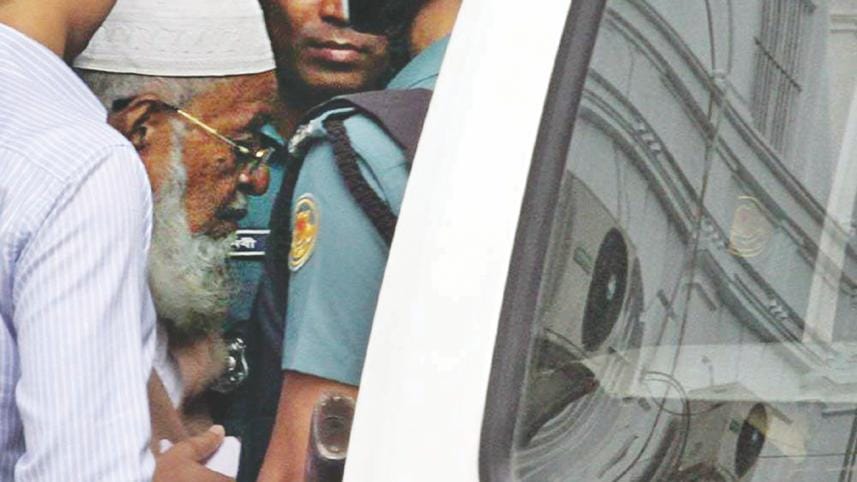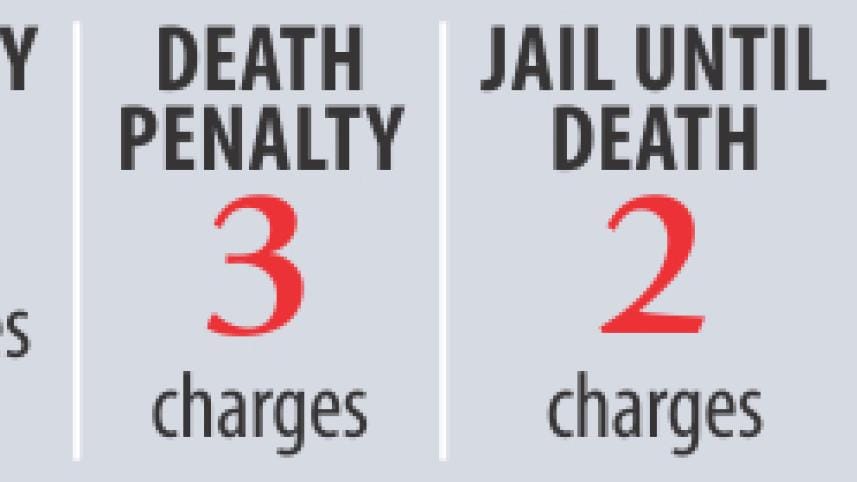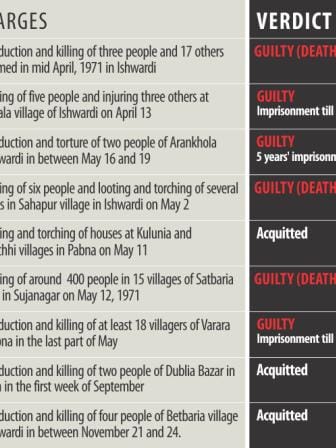DEATH for Subhan

"We fail to understand how the accused Subhan being a Bengali Muslim actively aided, abetted and facilitated the commission of such crimes with extreme cruelty against the non combatant civilians of his own locality. Did it match to humanity?" – Justice Obaidul Hassan.
He was too cruel to pay heed to the cries of a helpless woman. As she begged him to spare the life of her husband, he kicked her and signalled to Pakistan army personnel to shoot her husband dead.
His hands didn't tremble even for once as he dragged people out of a mosque and killed them.
He accompanied Pak army men and helped them carry out a synchronised attack in 15 villages where around 400 people were killed just because they supported the struggle for independence.
He is Abdus Subhan, a top leader of the Jamaat-e-Islami.

Around 44 years later, a special tribunal yesterday sentenced the Jamaat leader to death for committing crimes against humanity, including mass killing, murder, and confinement and torture of pro-liberation people during the 1971 Liberation War.
"The offences for which the accused Moulana Abdus Subhan has been found criminally responsible were the part of horrendous systematic attack against the civilian population ...," International Crimes Tribunal-2 Chairman Justice Obaidul Hassan said in a packed courtroom.
"The objective was to wipe out the Bengali nation by resisting in achieving its independence.
"Subhan had collaborated with the Pakistani occupation army with extreme ferocity in carrying out appalling activities directing pro-liberation civilians around the locality of district Pabna. It stands proved," he said while reading out the summery of the 165-page judgment.
The three-member tribunal found the two-time Jamaat lawmaker guilty on six of the nine charges against him.
Jamaat Nayeb-e-Ameer Subhan, who led the anti-liberation elements in Pabna, was handed down death sentence on three charges, imprisonment until death on two charges and five years' imprisonment on another.
The way Subhan participated in and facilitated the commission of the crimes inevitably aggravates his liability, said the court.
The offences committed by Subhan, the then acting chief of Pabna Jamaat and vice chairman of anti-liberation Peace Committee, constituted a "serious attack on human dignity or a grave humiliation of one or more human beings".

"We fail to understand how the accused Subhan being a Bengali Muslim actively aided, abetted and facilitated the commission of such crimes with extreme cruelty against the non combatant civilians of his own locality. Did it match to humanity?" said Justice Hassan.
The other two tribunal members are Justice Md Mozibur Rahman Miah and Justice Md Shahinur Islam.
The three charges that brought Subhan death are participation in the abduction and killing of three named and 17 unnamed people who had taken shelter at a mosque in Ishwardi; murder of six people, including Rajab Ali Biswas; and looting and torching of several houses in Sahapur village in Ishwardi; and killing of around 400 people in Satbaria union of Sujanagar.
Rajab's wife Jahanara Begum was one of the prosecution witnesses, who had narrated before the tribunal how she had begged Subhan to spare her husband's life on May 2, 1971.
The prosecution, however, failed to prove the Satbaria killing as genocide. The court considered it as an act of extermination.
"The offences as listed in charge number 1, 4 and 6 for which accused Abdus Subhan has also been found guilty indubitably fall within the kind of such gravest crimes which trembles the collective conscience of mankind," the court said.
About the killing of those who took shelter inside a mosque, it said, "What a brutality! It is hard to believe indeed that the accused was a man of slightest humanity and kindness."
Subhan was given imprisonment until death for his role in killing five people and injuring three at Juktitala in Ishwardi, and abducting and killing at least 18 people at Varara village in Pabna.
He got five years' imprisonment for his involvement in the abduction and torture of two people at Arankhola in Ishwardi.
All the sentences would merge into a single sentence of death, said the tribunal.
It, however, acquitted him on three charges relating to abduction, torching and killings in 1971.
Handing down the capital punishment to the 79-year-old man, the court said Subhan was prosecuted and tried for the "appalling atrocities" committed back in 1971.
"Advanced age of an accused does not readily warrant some mitigation of the sentence...considering the mode of participation and magnitude of crimes proved we are not convinced to take his old age into account as a mitigating factor, in awarding sentence," said Justice Hassan.
"... [T]he trauma and harm sustained by the victims and their families also significantly act in assessing the gravity of offences. A sentence therefore must always reflect the inherent level of gravity of a crime," he said.
Amid tight security, Subhan was brought to the tribunal around 9:00am.
He walked into the courtroom with the help of two policemen at 10:58am.
Wearing a white Panjabi, pyjamas and a cardigan, he sat on a chair during the 49-minute proceedings. He remained silent throughout.
About half an hour before the proceedings began, two crude bombs went off near Doyel Chattar, a few yards from the tribunal premises around 10:30, said police.
Arrested on September 20, 2012, the Jamaat leader from Pabna was indicted on nine charges in December 2013. After proceedings stretching over a year, the tribunal on December 4 last year said it would pronounce verdict any day.
The prosecution and pro-liberation organisations have expressed satisfaction at the verdict.
The ruling Awami League hailed the verdict while the BNP, as usual, kept mum. The Jamaat, for the first time, didn't announce any programme protesting the verdict.
Sultan Mahmud Simon, conducting prosecutor of the case, said, "We are happy that we have been able to prove the charges against Subhan."
Subhan's family members and the defence said they would challenge the verdict at the Supreme Court.
The Jamaat leader's son Nesar Ahmed claimed that his father is "totally innocent."
Subhan's counsel Shishir Manin said the court made "legal and factual errors" in the judgment.
According to the law, a war crimes convict can file an appeal with the apex court within 30 days from the date of pronouncement of the verdict.
Subhan was taken to Dhaka Central Jail from the tribunal and kept in a condemned cell, Forman Ali, senior jail super at the prison, told The Daily Star last night.
Two war crimes tribunals have so far delivered 16 verdicts. Including Subhan, nine Jamaat leaders have been convicted so far for war crimes.

 For all latest news, follow The Daily Star's Google News channel.
For all latest news, follow The Daily Star's Google News channel.
Comments